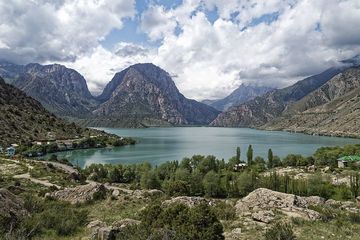Results for "culture"
76 Results
Venture capital
Primer text from The College of William & MaryADHD is one of the most commonly diagnosed conditions of children (Centers for DiseaseControl and Prevention, 2015).
In a 2016 Centers for Disease Control and Prevention study, scientists found that 6.1 million children aged 2-17 years living in the U.S. had been diagnosed with attention-deficit/hyperactivity disorder (ADHD), which is similar to previous estimates.
Ages 2-5: Approximately 388,000 children
Ages 6-11: Approximately 2.4 million children
Ages 12-17: Approximately 3.3 million children
The diagnostic term attention deficit/hyperactivity disorder (ADHD) refers to individuals who display patterns of inattention, impulsivity, and overactive behavior that interfere with daily functioning (American Psychiatric Association [APA], 2013).
The Diagnostic and Statistical Manual (DSM) V (APA, 2013) criteria for diagnosing ADHD listthree types of ADHD and the accompanying characteristics.
Predominantly inattentive type.The student may:o submit inaccurate or incomplete work,o have difficulty attending to conversations, activities, or tasks,o be easily distracted,o have difficulty following directions,o frequently lose materials, and/oro have difficulty organizing tasks and materials.
Read more

By: Anne miller New vijayalaxmi sant...
Due Date: Aug, 7, 2021
Culture and society
+1
Leave a comment

Regenerative Organic Agriculture
Regenerative agriculture is a conservation and rehabilitation approach to food and farming systems. It focuses on topsoil regeneration, increasing biodiversity.
Regenerative agriculture is a conservation and rehabilitation approach to food and farming systems. It focuses on topsoil regeneration, increasing biodiversity, improving the water cycle, enhancing ecosystem services, supporting biosequestration, increasing resilience to climate change, and strengthening the health and vitality of farm soil.
Regenerative agriculture is an adaptive management approach that is supported by soil health principles. There is no recipe or prescription because each farm or ranch differs based on unique natural resources, climate variability, and animal and ecological dynamics.
Regenerative agriculture practices are designed to reduce inputs of synthetic fertilizers and pesticides, increase soil organic matter, enhance biodiversity and restore ecosystems, particularly optimizing the hydrological cycle. While the general public knows little about the crisis of soil loss, there is awareness and concern regarding the climate crisis. The two are connected and the recent surge of interest in regenerative agriculture has been stimulated by the hope of climate resilience and carbon sequestration offered by regenerative agriculture.
Climate change mitigation has focused mainly on cutting carbon emissions and replacing fossil fuels with renewable energies. But more recently, carbon sequestration has come into the spotlight. The potential for agricultural practices to draw down and absorb carbon in the soil has begun to receive more attention.
Read more

By: rupali
Due Date: Sep, 30, 2022
Agri-food systems
Leave a comment

How Sociologists Define Culture
Culture is one of the most important concepts within sociology because sociologists recognize that it plays a crucial role in our social lives. It is important for shaping social relationships, maintaining and challenging social order, determining how we make sense of the world and our place in it, and in shaping our everyday actions and experiences in society. It is composed of both non-material and material things.
In brief, sociologists define the non-material aspects of culture as the values and beliefs, language, communication, and practices that are shared in common by a group of people. Expanding on these categories, culture is made up of our knowledge, common sense, assumptions, and expectations. It is also the rules, norms, laws, and morals that govern society; the words we use as well as how we speak and write them and the symbols we use to express meaning, ideas, and concepts (like traffic signs and emojis, for example). Culture is also what we do and how we behave and perform (for example, theater and dance). It informs and is encapsulated in how we walk, sit, carry our bodies, and interact with others; how we behave depending on the place, time, and "audience;" and how we express identities of race, class, gender, and sexuality, among others. Culture also includes the collective practices we participate in, such as religious ceremonies, the celebration of secular holidays, and attending sporting events.
Read more

By: rupali
Due Date: Jan, 18, 2025
Culture and society
+2
Leave a comment

agriculture scholarship
If a student is not responsive to behavioral strategies and interventions, more intensive interventions, such as functional behavior assessment and behavior intervention plans, should be considered (see Practical FBA).
No one intervention is universally effective for all students with ADHD. A combination of research-based and promising practices is recommended.
Here are several of these practices:
Giving DirectionsMany students with ADHD have trouble following directions. Here are some guidelines that might help address this problem.
Number of Directions: Give a minimal number of directions or steps at a time.If necessary, have students repeat the directions to the teacher or a peer partner.
Form of Directions: Provide written directions or steps, or a visual model of acompleted project. Teach students how to refer to these items as reminders ofprocess steps to complete tasks. This strategy is particularly helpful for long-termprojects.
Written AssignmentsMany students with ADHD have particular challenges with written work due to finemotorskills difficulties, motor planning issues, and difficulty alternating their attentionfrom a book to their written responses.
Read more

By: Anne miller New vijayalaxmi sant...
Due Date: Jun, 25, 2021
Agri-food systems
+1
Leave a comment

Agriculture
The four-part framework (investigating the issue, recognizing perspectives, communicating ideas, taking action) incorporated into this micro-credential reflects the changing role of our students in the 21st century. Students must have a substantive understanding of the complex, diverse, and interdependent world in which they live. Educators will delve into the research that supports the students becoming globally competent through inquiry. The four-part framework is described below. Additional resources are available in the “Supporting Rationale and Research” section and should be examined prior to completing this micro-credential.
Read more

By: Scarlet Patrick
Due Date: Aug, 20, 2021
Agri-food systems
Leave a comment

Global Competence Framework
The four-part framework (investigating the issue, recognizing perspectives, communicating ideas, taking action) incorporated into this micro-credential reflects the changing role of our students in the 21st century. Students must have a substantive understanding of the complex, diverse, and interdependent world in which they live. Educators will delve into the research that supports the students becoming globally competent through inquiry. The four-part framework is described below. Additional resources are available in the “Supporting Rationale and Research” section and should be examined prior to completing this micro-credential.
Read more

By: Scarlet Patrick
Due Date: May, 15, 2021
Culture and society
+1
Leave a comment
Earth’s natural greenhouse effect
The social-ecological model emerged from ecological systems theory (Bronfenbrenner, 1979), which explicitly sought to examine transactions between persons and their environments. The model stresses cross-level influences, in which community or organizational environments can shape individual behavior (top-down effects), but also examines how individuals form groups or take actions that may affect higher level organizational or community spheres (bottom-up effects). The Centers for Disease Control and Prevention has incorporated social-ecological models into a number of its health promotion and disease prevention efforts.
The simple onion or Russian doll rendering of social-ecological relations as concentric circles is not in itself very informative. However, flowchart models based on such relationships can be useful for specifying hypothesized cross-level influences.
Read more

By: rupali
Due Date: Mar, 20, 2021
Culture and society
+2
Leave a comment
home environment: Impact of culture
The home environment is critical for maintaining health and well-being among the medically ill and people living with disabilities. Access to appropriate supportive care technologies and home health care services depends in part on where homes are located, what sorts of spaces are available for care in the home, and whether basic services (such as utilities) are reliable. These aspects of home environments are difficult to measure, even when features of homes are narrowly defined and only a single attribute, such as safety, is considered (Gitlin, 2003). Measurement challenges become more complex when considering that each of these environmental features also has a cultural or social component. Homes are located in neighborhoods, where home health care providers may not feel welcome or safe because of crime in a low-income neighborhood and discrimination or suspicion in a higher-income one. Homes differ in their spaces available for care but also in the willingness of families to make these spaces available, adapt them as needed, and work with home health staff to provide care. Also, utilities, telephone service, and access to services differ by community, with some communities well serviced and others shortchanged.
Read more

By: Edwin Castel
Due Date: Mar, 18, 2021
Culture and society
+3
Leave a comment
Food Tech Scholar
Types of accommodations
Accommodations are typically divided into four categories:
Presentation accommodations
Response accommodations
Setting accommodations
Timing and scheduling accommodations
How can educators identify and select accommodations to address the needs of individual students?
Using a set of guiding questions, the teacher will identify one response accommodation for a student with a disability based on his or her individual strengths and needs and the barrier created by the disability. The educator will then implement the accommodation and evaluate its effectiveness. Finally, the teacher and student will reflect on the effectiveness of the accommodation.
Read more

By: Lorell Sandi
Due Date: Feb, 26, 2021
Culture and society
+2
Leave a comment

Africa's rapid economic transformation
Check out this article co-authored by Thom Jayne, Adesoji Adelaja, and one of AAP's co-directors, Richard Mkandawire.
https://www.rural21.com/english/current-issue/detail/article/africas-rapid-economic-transformation.html
Read more

By: Sali Hamilton
Due Date: Dec, 26, 2020
Culture and society
+3
Leave a comment

Africa's rapid economic transformation -Women in Agribusiness Digital Marketplace
Check out this article co-authored by Thom Jayne, Adesoji Adelaja, and one of AAP's co-directors, Richard Mkandawire.
https://www.rural21.com/english/current-issue/detail/article/africas-rapid-economic-transformation.html
Read more

By: Sali Hamilton
Due Date: Dec, 26, 2020
Culture and society
+2
Leave a comment

Data leakage detection system
The primary task of data leakage detection systems is to detect data leakage and discover the sources for the same. If ever an organization’s sensitive data gets leaked, it may then finds its way to unauthorized devices. This is why it is crucial to trace the source of data leakage so that you can nip the problem in the bud.
Read more

By: Edwin Castel
Due Date: Oct, 28, 2020
Agri-food systems
+1

Leave a comment